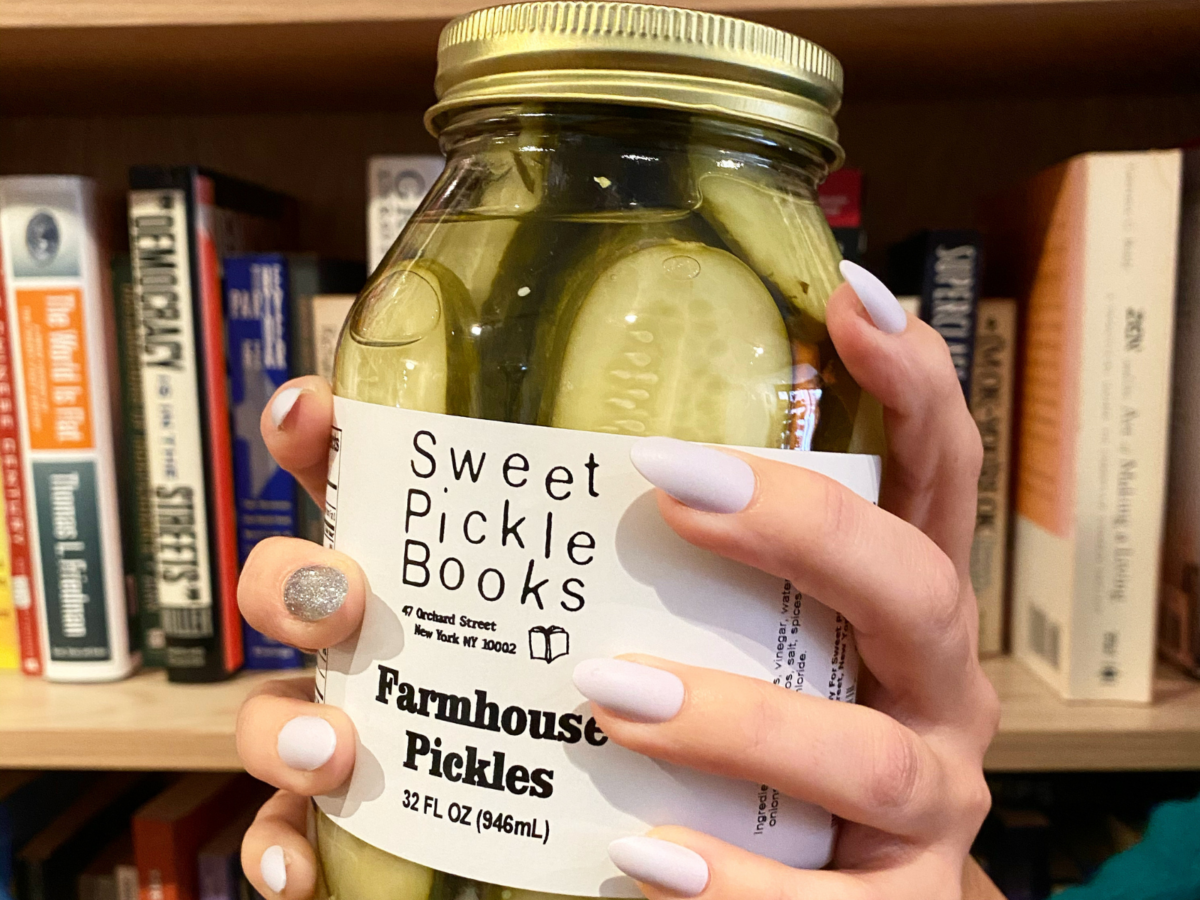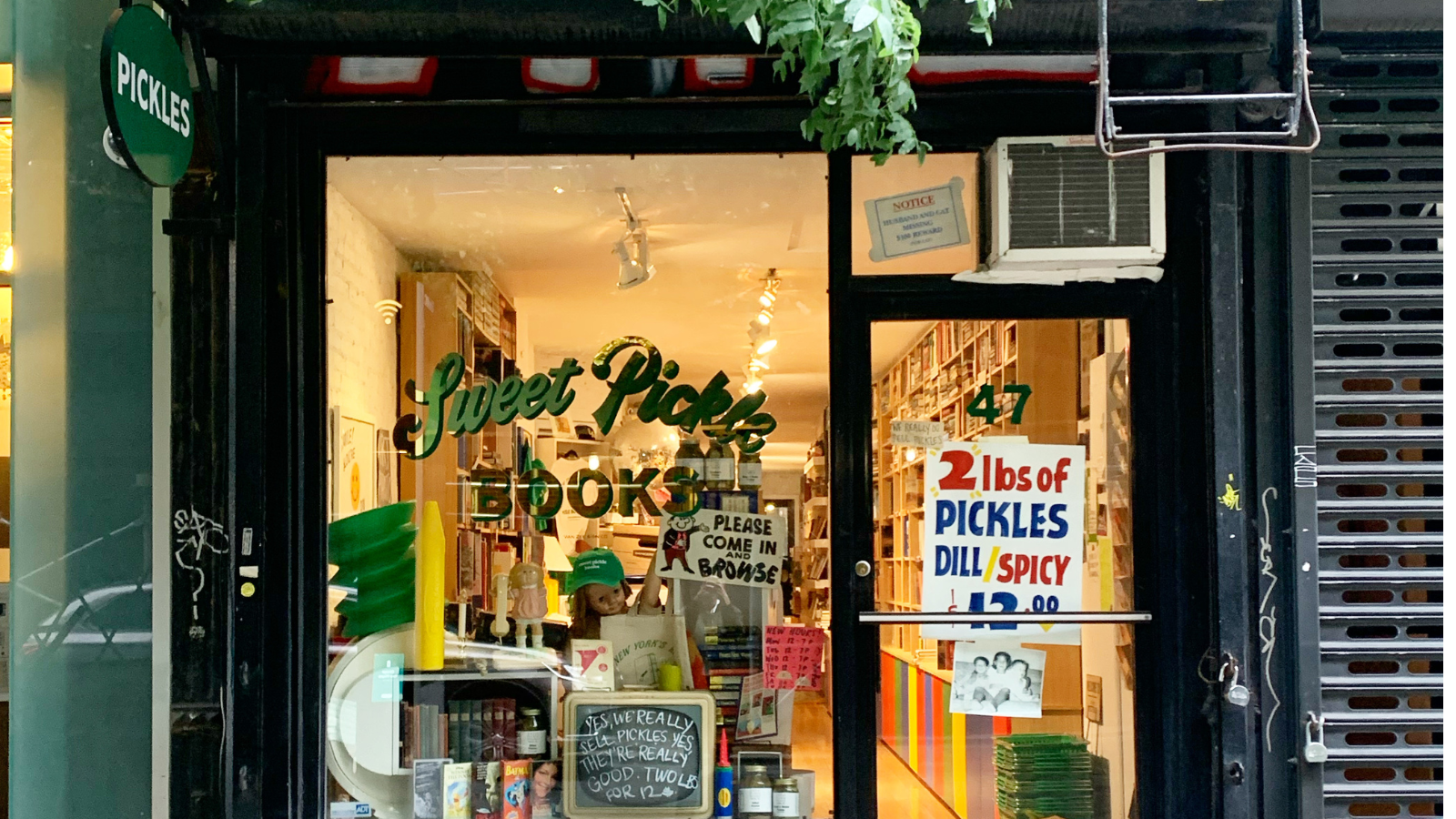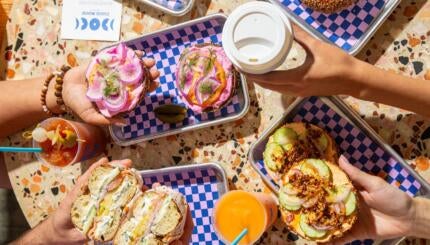If there’s one generalization that can stand the test of time, it’s that Jews love pickles. They’re a briny bit of respite from a heavy meal, the snack that solidifies the romantic connection between the protagonists of “Crossing Delancey,” and the hook that keeps people coming back to Sweet Pickle Books — a one-of-a-kind used bookstore at 47 Orchard St. on the Lower East Side that also sells its own line of pickles.
If you’re questioning just how, exactly, one comes up with the concept of a pickle book store — let alone one that’s become an au courant hangout spot downtown — you’re not alone. Founder and owner Leigh Altshuler, a 30-year-old book- and pickle-lover, came up with the idea at the beginning of the pandemic.
“I knew [the store] was going to be books and something and it didn’t have a name, and I knew I wanted it to be after family and being Jewish…and I was just thinking about the lowest common denominator between the two and it was just like..pickles. And that’s where it all began.” Altshuler said.
The idea of opening a used bookstore first hit Altshuler at the beginning of the pandemic. “I really became a big ol’ mushy weirdo about books,” Altshuler said. “I went into Mercer Books which was closing that day in March at 3pm, and I remember a cop came in at, like 2:53, and asked the owner why he wasn’t closed yet. And I was just like, ‘he has time!’”
The Nosher celebrates the traditions and recipes that have brought Jews together for centuries. Donate today to keep The Nosher's stories and recipes accessible to all.
“I walked home and I just thought it was such a shame that these stores are closing and who knows what’s going to happen,” she said.
A former communications director for New York’s legendary used bookstore, The Strand, Altshuler saw the myriad of empty storefronts across the Lower East Side as an opportunity to set up a shop of her own. After losing her marketing job at the McKittrick Hotel and getting over a breakup in her shoebox apartment, Altshuler opened Sweet Pickle Books in October 2020. It was both a financial gamble and an attempt to honor her personal affinity for the used book industry — a community that felt especially precarious during the height of the COVID-19 pandemic.
As for the pickles, Altshuler and her boyfriend originally experimented with dozens of recipes from during the lockdown by testing out different salt and cucumber varieties until they batched out the first 360 jars — which barely lasted a month. Now, she sources the pickles from a Texas-based farm, and regular customers can swap their book donations for a free jar of branded pickles or buy them separately in store or online, coming in flavors bread and butter, spicy, and dill for $9.50-$12.95.

Which, for operating in a neighborhood that used to be known as the Jewish “pickle alley” in the late 19th and early 20th century, feels perfectly kismet. Altshuler lives about four blocks away in the Lower East Side, and while taking walks during the pandemic saw the empty storefronts and remembered how growing up, relatives told her about the influx of Jewish immigrants that were able to sell and make pickles for cheap in barrels and pushcarts. On the cross street that Sweet Pickle Books is nestled between, over eighty Jewish pickle vendors used to make their living, which is history that Altshuler is very grateful she gets to inform people about for the first time and inadvertently continue the legacy.
“When I first opened, everyone said I was crazy,” she said. “My dad kept on saying to me, ‘Oh, if you do it,’ and I was like, there’s no more ‘if’ here, it’s happening!”
“I don’t even know why I had such a belief it would work,” she added, “but I think it was just a feeling.”
Now, two years out, Sweet Pickle Books is a quirky literary destination for locals and tourists alike — and browsing through the store, it’s easy to see why. The railroad-style aisles are lined with love-worn paperbacks that tend to hover below the $10 mark, a disco ball swings in the corner, and the smooth stylings of the Vince Guardali Trio softly murmur from speakers throughout the store. There’s a pickle costume that young customers frequently take photos in, and big names like Harry Styles and Fran Leibowitz, said Altshuler, have popped in.
To the untrained eye, it may seem like a miracle that a first-time business owner successfully opened a brick and mortar store during a pandemic — let alone one selling actual books amidst a digital culture that mostly obtains information online. Some people think it’s odd that people would even be interested in books anymore, let alone used ones. But Altshuler knows better than that.
“Everyone always asks me, ‘Do people read anymore?’ But book people literally show up and haul books across town because they love it and care about these things,” Altschuler said. “[Sweet Pickle Books] just became the lowest common denominator where people could go for a low price tag and have a real conversation about something.”
Growing up in a heavily Jewish suburb in South Florida where she regularly cruised around the JCC, Altshuler always considered both her culture and religion an innate part of who she is and how she moves about the world. “I basically had no idea that people weren’t Jewish because that’s just where I was from,” she said. “My boyfriend is from Australia and he had no idea that you get a bowl of pickles with your meal at a diner, and I thought every restaurant in the world had that.”
Altshuler still proudly self identifies as Jewish, and running a business in the ancestral heart of Jewish history has only made her connection to her heritage even stronger. “I think [Sweet Pickle Books has] connected me to faith in ways I didn’t really expect,” she said. “I’m understanding the themes in different ways, and seeing the importance of passing tradition on. And so much of that is centered around food, but also stories — and storytelling is exactly what a bookstore is. I feel like it just makes sense.”
In this way, Sweet Pickle Books became a conduit for tradition that feels authentic to Jewish customers and accessible for those who would like to learn more. “A customer of mine found out that she was Jewish and came to me on New Years Eve with a babka and a Zabars mug and told me that she wanted to thank me for teaching her so much about Judaism,” she said, “and she was so happy to have a friend to talk to about being Jewish.”
“I just didn’t expect to be that person for someone,” she added. “That’s a really wonderful thing that I feel like my Jewish mother would be doing cartwheels over.”
Incidentally bridging the gap between communities isn’t something limited to Judaism, though, as Sweet Pickle Books is known to attract customers of all creeds — from the older, New York born-and-bred book hagglers that Altshuler lovingly refers to as her “curmudgeons,” to the droves of TikTok tweens in handkerchief tops, hoping to go viral by posting about a crazy new pickle shop. By harnessing the virtues of old school tradition and trendy innovation, “I really do want to be the bridge between the two,” she said.
“Sometimes I just look at the store and I want to cry because it’s so sentimental to me — like, it’s so real and important in New York history,” she added. “So many people don’t know this was a pickling district, and every day, I’m like, how else would these conversations happen? It makes me look up stuff, and I feel very special that I get to tell people.”



